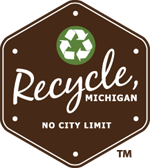BATTERIES
Where to Recycle: Drop-Off Centers and Mail Back Programs
Why can’t this item go in my curbside bin?
Batteries pose a fire hazard both it disposal transit and in recycling sortation machinery. Fires at recycling facilities have been on the rise and the number 1 cause has been lithium ion batteries.
Why is it important to recycle batteries?
Battery use is on the rise as technology continues to advance. According to the U.S. EPA, about three billion batteries are sold every year in the U.S. This is equivalent to about 32 per household or 10 per person, with about 8 household batteries being disposed of per person per year. Many batteries contain heavy metals which can pollute the environment if disposed of improperly.
Batteries are a collection of one or more cells where chemical reactions create a continuous flow of direct current (DC) electricity. They are comprised of three components: the anode (the – side), a cathode (the + side), and an electrolyte, which is the substance that chemically reacts with the anode and cathode. These three components must be stored in a structure or “casing” which can be made of plastic, metal, or other types of materials.
What types of this material qualify for recycling?
When handling and disposing of batteries it's best to know the type so you can find a collection site or event near you. For more information, visit Cirba Solutions or Call2Recycle! which offers various recycling options for communities, retailers, businesses, and public agencies.
Dry-Cell Batteries – Dry-cell batteries include alkaline and carbon zinc (9-volt, D, C, AA, AAA), mercuric-oxide (button, some cylindrical and rectangular), silver-oxide and zinc-air (button), and lithium (9-volt, C, AA, coin, button, rechargeable). Alkaline batteries are everyday household batteries used in flashlights, remote controls, and other appliances, modern alkaline batteries contain little to no mercury. Most small, round, “button-cell” type batteries found in items such as watches and hearing aids contain mercury, silver, cadmium, lithium, or other heavy metals as their main component. Button cells are increasingly targeted for recycling because of the value of recoverable materials, their small size, and their easy handling relative to other battery types. Several reclamation companies now process these batteries. Call your local recycling contact to find recycling opportunities in your area.
Rechargeable Batteries – Rechargeable batteries are a responsible choice for portable energy and the Rechargeable Battery Recycling Corporation (RBRC), a nonprofit public service organization, targets four kinds of rechargeable batteries for recycling: nickel-cadmium (Ni-CD), nickel metal hydride, lithium-ion, and small-sealed lead for recycling across the country.
Lead-Acid Automobile Batteries – Ninety-six percent of all lead-acid batteries are recycled. Almost any retailer that sells lead-acid batteries collects used batteries for recycling, as required by the state. Reclaimers crush batteries into nickel-sized pieces and separate the plastic components. They send the plastic to a reprocessor for manufacture into new plastic products and deliver purified lead to battery manufacturers and other industries. A typical lead-acid battery contains 60 to 80 percent recycled lead and plastic. In Michigan it is illegal to dispose of lead-acid batteries through traditional landfill disposal, see specific requirements at Michigan EGLE's Universal Waste guidance.
Non-Automotive Lead-Based Batteries – Gel cells and sealed lead-acid batteries are commonly used to power industrial equipment, emergency lighting, and alarm systems. The same recycling process applies to automotive batteries. An automotive store may accept these batteries for recycling or a local recycling contact may have other resources available to you.
The Bottom Line:
1.) Know what type of batteries you have before looking for a recycling or disposal option.
2.) Check with your retailer or manufacturer to determine if they offer recycling programs - information is often contained on websites.
3.) Check with your local recycling service provider or local government to see if they offer battery recycling at special events or drop-off centers.
4.) If there are no other options, find a mail-back program for your battery type or a business that recycles batteries for a fee.




